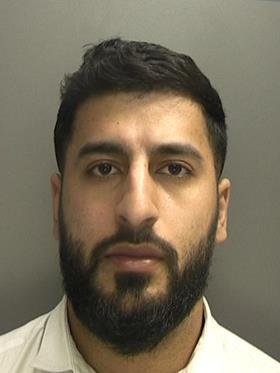A paralegal assistant who accessed three case files more than 500 times was yesterday jailed for three years and nine months.
Muhammad Iqbal, 27, who worked for the CPS from February 2014 until his dismissal in 2021, admitted misconduct in public office and perverting the course of justice before his sentencing at Southwark Crown Court.
He accessed three files via the CPS case management system between April 2014 and May 2019 and was suspended from his role after the offending was discovered.
Iqbal, from Birmingham, accessed case files ‘within just seven weeks’ of starting at the CPS. On multiple occasions he was ‘immediately in contact’ with people connected to the defendants in the case files he accessed.
He also helped a driver escape prosecution for speeding after providing false details to the speed enforcement unit.
DCI Pete Cooke, from the regional organised crime unit for the West Midlands, which investigated Iqbal, said: ‘Within just seven weeks of Iqbal starting work at the CPS, he had been accessing the case files of a relative who was being investigated for a serious wounding. He accessed this case an incredible 593 times without any good reason to.

‘He accessed files for people who went on to be convicted of involvement in a Birmingham-based organised crime group, importing and supplying kilos of heroin.
‘They were handed sentences of between five and 13 years, but Iqbal’s criminal activity had the potential to undermine those prosecutions.
‘We will work hard to root out and prosecute corruption wherever it lies within the criminal justice system, so that the public and victims can have the confidence they deserve in the legal system.’
Rosemary Ainslie, head of the Special Crime Division at the CPS, said: 'Iqbal’s conduct was simply unacceptable. He repeatedly viewed sensitive documents that he had no authorisation to access and used his position to help a driver escape prosecution for a road traffic offence. He displayed a flagrant disregard to CPS policies around sensitive information and risked damaging public trust and confidence in the CPS.'






























